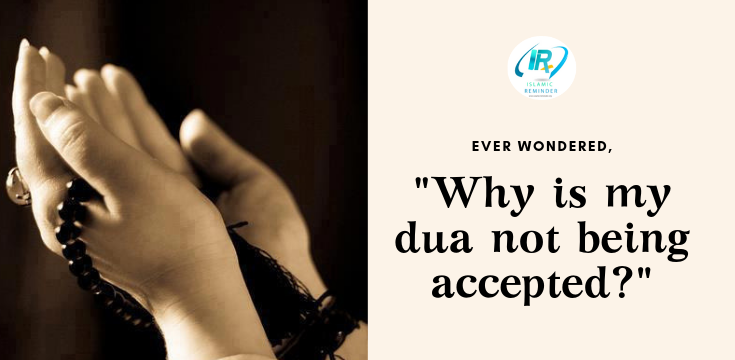Dua or supplication is an important part of our faith. Allah (swt) has granted us the gift of invoking him in times of need. But sometimes we keep on praying for something and we seem to get no response. We become disheartened and stop supplicating. And often-times, we start thinking “Allah is All-Seeing, All-Hearing, so why doesn’t He listen to me? Can’t He see the pain I’m in?”. Shaitan keeps pouring such thoughts into our brains and we become distant from Allah Almighty while dua should be a source of keeping the supplicant closer to Allah.
So, why does this happen? When we make dua, sometimes they are accepted and at other times they are not.
Allah Almighty says in the Holy Quran:
“And when My servants ask you, [O Muhammad], concerning Me – indeed I am near. I respond to the invocation of the supplicant when he calls upon Me. So let them respond to Me [by obedience] and believe in Me that they may be [rightly] guided.” (Quran 2:186)
From the above verse, we gather that Allah Almighty listens to ALL our duas. But He also says “Let them respond to Me [by obedience] and believe in Me”.
According to the Quran and hadiths, here are some reasons why our duas are not answered or fulfilled.
1. Sincerity:
One must sincerely and purely direct his supplication to Allah alone without associating partners with Him. He must not worship to show-off to the people or to seek fame. He must not perform Hajj, for example, so that it he wants others to say, “He is Al-Hajj (or Haaji),” or give in charity so that he wants people to say, “He is generous and bountiful,” or to fast in desire of the people’s praise of him, “Look how often he fasts.” If one performs his deeds seeking praise from the people, his deed is nullified. Likewise, when supplicating to Allah for something that you want from Him, you must seek it from Him sincerely. Call upon Allah whilst you are aware of the fact that you are in need of Allah, and that He is free of any need of you, and He is fully able to give you what you seek from Him.
2. Dua must be devoid of sin:
The supplication must not contain any sin and transgression. If the supplication is sinful, then it will not be accepted by Allah, even if the father supplicates against his own children, or the mother supplicates against her own children. Allah does not accept supplications that transgress against others. Allah, the Most High said:
“Call upon your Lord in humility and in secret. Indeed, He likes not those who transgress beyond bounds.” (Quran 7:55)
So if a person supplicates seeking something sinful such as asking for a thing which is prohibited in the Religion, it will not be accepted because it is transgressing the bounds. If one asked Allah, “O Allah, make me a Prophet”, then this not permitted and is transgressing beyond bounds and is not accepted by Allah. If a person was to supplicate against the one he has oppressed, it will not be accepted. If a mother was to supplicate against her own son because he loves his wife, it will not be accepted. If a father was to supplicate against his son because he accompanies pious and good people, then it will not be accepted. So the supplication must not contain a request to sin or to transgress the bounds of the Sharī’ah.
Abu Huraira reported Allah’s Messenger (ﷺ) as saying:
“The supplication of the servant is granted in case he does not supplicate for sin or for severing the ties of blood”. (Sahih Muslim 2735 c)
3. Showing Impatience:
Abu Huraira reported that Allah’s Messenger (ﷺ) said:
The supplication of every one of you is granted if he does not grow impatient and says: I supplicated but it was not granted. (Sahih Muslim 2735 a)
4. Abandoning all that is prohibited:
A person must abandon what is prohibited by Allah, such that he does not eat what is forbidden, or consume usury, or wealth obtained through trickery or deception, and so on. The supplication of such a person is not accepted. The evidence for this is following hadith:
Narrated Abu Hurairah:that the Messenger of Allah (ﷺ) said: “O you people! Indeed Allah is Tayyib (good) and he does not accept but what is good. And indeed Allah ordered the believers with what He ordered the Messengers. He (ﷺ) said: ‘O you Messengers! Eat of the good things and do righteous deeds. Verily I am well acquainted with what you do (23:51).’ And He said: ‘O you who believe! Eat from the good things We have provided you (2:172).’ He said: “And he mentioned a man: ‘Who is undertaking a long journey, whose hair is disheveled and he is covered with dust. He raises his hands to the heavens and says: “O Lord! O Lord!” Yet his food is from the unlawful, his drink is from the unlawful, his clothing is from the unlawful, and he was nourished by the unlawful. So how can that be accepted?'” (Jami Tirmidhi: Vol. 5, Book 44, Hadith 2989)
The Prophet (ﷺ) made him far distant from having his supplication accepted, even though this man was worthy because he was upon a long journey, dusty and disheveled due to it. However, due to his food, drink, earnings and clothing being unlawful he became distant from having his supplication accepted by Allah.
So these are the four conditions of a supplication that must be present.
May Allah alleviate the sufferings of the Muslims all over the world and make us rise as one Ummah again!
Partly taken from: abukhadeejah.com




